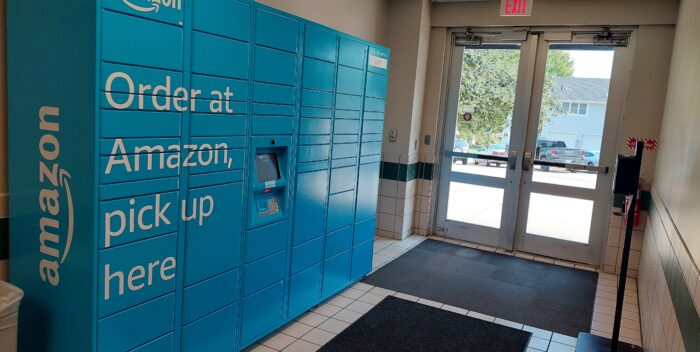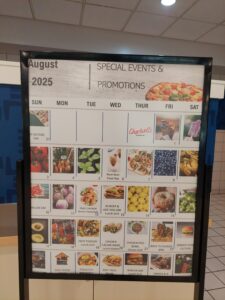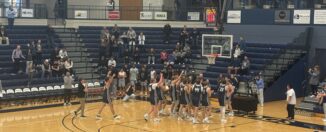Fall 2025 semester brings changes to mailroom, textbooks, vehicle registration and more
New code-access Amazon lockers are located by the south entrance to the Janzow Campus Center off Lincoln Street.
By Natalie Guske and Nora Betts
Photo credit: Nora Betts
What to know about the mailroom:
Students this fall will receive all mail and Amazon packages through code-access dropboxes instead of individual, key-access mailboxes in an effort to improve and modernize the campus mail system, said Chief Operating Officer Kim Boyce.
Summer renovations to the basement of the Janzow Campus Center included the removal of more than 1,000 key-access mailboxes and the introduction of 95 code-access dropboxes and 65 Amazon Lockers.
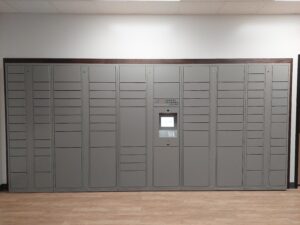
New code-access mail dropboxes adjacent to the Fan Shop in the lower level of Janzow. Photo: Nora Betts.
An internal CUNE study last year found that less than seven percent of Concordia students received mail in their individual, key-access mailboxes, which Boyce said had been in place since the 1990s. The majority of student mail comes in the form of Amazon packages.
“It is in the tens of thousands of packages that we get through Amazon that are shipped here every academic year,” said Boyce.
The new mail system aims to adapt to the modern student’s needs, Boyce said. The code-access system is package-driven, incorporates email alerts about mail pickup, and creates convenient, 24-hour access to mail and packages.
Students who receive regular, non-Amazon mail or packages will receive an email that their mail is ready to pick up, featuring a unique tracking number and code. They will scan the barcode in the email or type the code into the dropbox console, which opens the designated mailbox door and gives them access to their mail. Students can have someone else pick up their mail by forwarding their notification emails.
If students do not pick up their mail within three days, it will be removed from the dropbox and held in the mailroom for pickup during operating hours.
Regular mail will be removed and held in the mailroom over extended breaks, such as during the Thanksgiving and Christmas holidays.
The new system for Amazon packages works in a similar way. Students will select the Amazon Locker in Janzow as their delivery location when they check out online. They will receive an email when their package is ready to pick up and they can enter their code in the console of the blue Amazon dropbox. Students can also have someone else pick up their mail by forwarding their Amazon Locker notifications.
Amazon packages must be picked up within three days of delivery. After that, packages will be removed from the Amazon Lockers and returned, and credits will be issued. This three-day limit is an Amazon policy, not a Concordia mailroom policy, as Amazon operates and services the locker system.
Amazon packages will not be held for longer than three days over extended breaks, such as Christmas, Thanksgiving and fall break.
Boyce said the new mail system is convenient because it allows students to pick up mail and packages at any time, not just when the mailroom is open.
“It’s more convenient in the sense that you don’t have to wait for thinking ‘When’s the mailroom open?’ and ‘Can I get that?’ and all those kind of things,” said Boyce. “I do know now. I know as soon as it’s put into the box.”
The new dropbox and Amazon Locker system applies to all on-campus undergraduate students who receive mail, including students living in Jonathan Hall.
Boyce said the number of mailroom student workers has not been affected by the new system. The campus mailroom also offers USPS, FedEx, and UPS package drop-off in addition to its pick-up services.
What to know about textbooks:
The new Textbook Access Program is rolling out this fall, using a flat-rate fee and automatically providing students with no-hassle bundles of all their textbooks for the whole semester, according to Chief Operating Officer Kim Boyce.
Students who opt out of the program by Sept. 1 will not be charged the fee, which is $325 per semester, and will need to find their books through alternate vendors like Amazon or through Concordia’s online bookstore.
Boyce said convenience is a big factor of the program, as students no longer need to determine which of their textbooks are required versus optional, search through several vendors, place multiple orders or worry about package tracking. Instead, when students register for classes, all of their required textbooks are automatically ordered and shipped to campus before the first day of school. Digital materials and ebooks are added to their online library on the bookstore website, www.cune.textbookx.com.
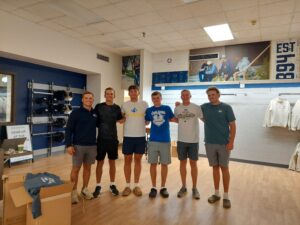
Bulldog men’s golf team members pick up their textbooks from the Fan Shop on Aug. 15. Photo: Nora Betts.
“This [program] — I sign up for a course, it’s done,” Boyce said. “If there’s a class, it’s either print or it’s digital. It’s really about student convenience.”
Students in the program can pick up their textbooks from the newly remodeled Fan Shop in the basement of the Janzow Campus Center during operating hours.
Affordability is another factor in favor of the program, Boyce said. He found that the average student pays more than $1,100 per year for books and supplies. He said the Textbook Access Program can help students cut these average costs.
“Beginning in Fall 2025, this new program gives all students increased accessibility to all physical and digital course materials including textbooks, lab manuals, access codes, electronic books and other needed items at a single flat charge,” Boyce said.
The original plan was to charge per credit hour but Boyce said that since students average 16 credits per semester, a bookstore contract featuring a flat-rate fee actually helps lower the cost for students.
Students can opt out of the program through the bookstore website, and the dropped fee will be reflected on their student accounts after the course add/drop date on Sept. 1. Students opting out of the program are not responsible for any other fees or shipping, even if their books are already on campus.
“You may not have decided if you are participating in the program or opting out, and you may have already received shipping notifications for some of your books,” said Boyce in an Aug. 14 email to undergraduate students. “That’s okay! If you decide to opt out, those books will be returned at no cost to you.”
Students who choose to opt out and find their textbooks on their own can still purchase available books through Concordia’s online bookstore.
As of Aug. 14, Boyce said 86 percent of students remained opted into the Textbook Access Program. He said he looks forward to hearing feedback about the program from students and Student Senate officers as the academic year begins.
One of the biggest changes on Concordia’s campus this fall is that the bookstore in the basement of Janzow, where students have purchased their textbooks for years and years, is gone, and a new Fan Shop is ready for business.
Students now get their textbooks in a bundle from new textbook provider Akademos. The books are automatically ordered when students sign up for classes, and there is a flat fee of $325 per semester. Students can opt out of the textbook program, but then they have to find another textbook source, such as Amazon or the online campus bookstore at cune.textbookx.com.
What to know about the fan shop:
“We are becoming a Fan Shop, that is our main goal,” Fan Shop manager and shooting coach Dylan Owens said.
Owens said the Fan Shop will receive and distribute books or return those sent to students who opt out of the textbook program. It will still sell Blue Books, goggles, and choir/band/music folders requested by professors, and some small items, like notebooks, for convenience.
“However, these are not the main focus of our sales,” Owens said.
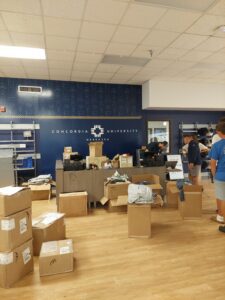
Dylan Owens prepares the newly-renovated Fan Shop for the start of the school year. Photo: Nora Betts.
Instead of operations run by a vendor, the Fan Shop can now source items from outside companies, giving it autonomy over the items it sells and their prices.
“We have the ability to independently source gear and spirit wear from whomever can get us the products we want or need,” Owens said. “The goal [is to] keep the cost down for students, parents, alumni, and anyone who wants to support and represent us.”
The Fan Shop also will have a website where people can shop and order items online.
“We are working to finalize all details of the online store and will be getting out the links once finished, hopefully by initial launch of the in-person store,” Owens said. “Most regular items will be available online [while] special edition or limited runs of items will be available in-person only.”
Owens promised a welcoming staff and an open mind to any ideas or feedback students may have concerning the store’s items.
“Our simple goal is to provide opportunities for students, faculty, staff, parents, and alumni to represent our university with our gear and apparel,” Owens said. “If we can see more people wearing Concordia University, Nebraska, gear than other institutions gear around campus I will feel accomplished!”
What to know about vehicle registration:
It’s not only students who are returning to campus this fall, but their vehicles as well.
As a rule, all students must have their car registered with security so that security officers can easily identify non-Concordia vehicles in Concordia parking lots.
“We have limited parking spaces, [especially] for faculty and staff,” said Director of Campus Safety and Security Dana Metzger. “Parking passes identify vehicles that belong to Concordia or are associated with Concordia, that way we don’t have people from the local neighborhoods [or elsewhere] parking in our parking lots and taking up spaces meant for students.”
Instead of venturing down to Buildings and Grounds to get a parking sticker like in previous years, students now will go to the security office, which has relocated from Thom to the basement of Janzow.
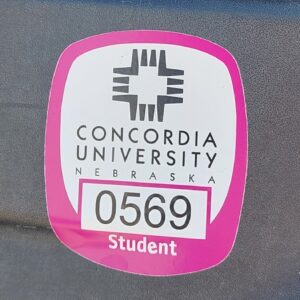
Students must register their vehicles and get parking stickers from campus security. Photo: Nora Betts.
“The first step [for registering a vehicle] is to go to the security office,” Metzger said. “Now people don’t have to go look for parking passes and permits at Buildings and Grounds or HR like they used to. They can just come to one location. Our business hours are going to be Monday through Friday, 8 a.m. to 4 p.m.”
When students go to register a vehicle, they fill out a form that requires information such as their name, car insurance either in their name or in a parent’s name, license plate number, a point of contact, and the color, make and model of their car.
“We have the parking permits to help us identify students’ vehicles,” Metzger said. “[For example], right now we’re seeing a whole bunch of those trees that blew over during the storm [and students] might have a vehicle under a tree that needs trimming. Now we can run their parking pass, find out who the student is, give them a call to see if they can move their vehicle so we can get work done and not damage their vehicle.”
Returning students are exempt from having to go to security to reregister their vehicle or to pick up a new sticker, unless they’ve had a change in vehicles.
“If they have any [temporary] changes in vehicles, [like] a rental [while] taking their vehicle in to get damages fixed, or they’ve had to swap out for a while with a parent or somebody, they can get a temporary parking pass in the security office,” Metzger said. “That’s something that they’ll hang in their rear-view mirror so we can tell that they’re still registered but their current vehicle is not being utilized at the moment.”
Starting this school year, students who have bikes on campus also are required to register with security, who will be working with the Seward Police Department.
“A lot of times when students leave after the final semester, they leave their bicycles,” Metzger said. “Now we can use that registration number to find it— just like the parking pass contact information.”
Bicycles that look like they’ve been abandoned at the end of the semester will be stored and students can claim them from the security office.
“We can then go to the bicycle yard and possibly help them locate it. But if they don’t claim it after 30 days, we donate the vehicle,” Metzger said.
The new bicycle registration program also should make it easier for security to track down bikes stolen from campus.
“Now you can just use that sticker, your registration number, and we can pull up your bicycle and locate it if the Seward Police Department finds it,” Metzger said. “We’ve done this before [with the police department], since they’ve found stolen bicycles from campus at Walmart and other places.”
What to know about the dining hall:
Chartwells Director of Dining Services Patrick O’Brien is taking student survey results to heart and addressing concerns about weekend food quality and overall monotony as the 2025-2026 school year begins. He and the Chartwells management team are working to implement more special events during the semester, add student favorites to the menu rotation, and respond to student feedback.
“We are wanting to take feedback directly from [last semester’s] surveys and implement them to show students this isn’t just a formality and we as a team aren’t just going through the corporate motions,” said O’Brien.
O’Brien is starting his third full year with Concordia and his 16th year in college food service. He said that college dining food can be monotonous, but it doesn’t have to be.
He plans for Chartwells to host 10 to 15 special events every month, including new offerings at the traditional food stations and national food holiday celebrations. For example, Sept. 25 is National Quesadilla Day, which will be highlighted with a special event in the Janzow dining hall.
“Myself and my new sous-chef Mason [Korensky] will be doing a cook-to-order quesadilla bar for the students,” O’Brien said. “It gives me an opportunity to be in front of the students a little bit more, but also gives the students an opportunity to customize their meal.”
One big hit among students has been BBQ Fridays, made possible by using O’Brien’s own meat smoker. Chartwells has been approved to purchase an indoor smoker, which O’Brien said will expand barbeque options and help provide more of the food that students love.

Chartwells plans to offer more special events like the dining hall garden party in the spring 2025 semester. Photo submitted by Patrick O’Brien.
“[The indoor smoker] opens up multiple, multiple avenues of opportunities for us,” he said. “We can actually do our own deli meats in house and smoke our own turkeys, so that will be a fun piece of equipment, and it will be in line with what students have specifically requested on the surveys.”
When O’Brien is out of the office on the weekends, he said Chef Mason will be working to manage food quality and variety.
“[Chef Mason] is actually going to be working more on the weekend side of things because I hear the food still throughout the week is good, but it kinda tails off on the weekend,” O’Brien said. “Chef Todd [Kallenbach] and Chef Mason have been hyper-focused on having better menu selections and preparation on the weekends.”
O’Brien emphasized his open-door policy to bridge the gap between students and dining services. He said he wants to start a food committee where students meet with him bi-weekly and offer feedback on the dining hall. Interested students can email him at Patrick.OBrien3@compass-usa.com.
O’Brien encouraged students with food allergies and dietary restrictions to come directly to him to discuss their dietary needs. Chartwells invested from $30,000 to $40,000 in its allergen safety system, Nutrislice, to make students feel comfortable with the food they are served. The system includes digital food labels that show students allergen warnings for each dish, which O’Brien said creates transparency between the kitchen and the serving station.
“Just from a safety standpoint and from a relationship standpoint with me, I just want to make sure that students feel that comfort level that, if they need something, we are really here for them,” he said. “It’s not a formality, similar to the surveys. Whatever they need, we will take care of them.”
O’Brien knows that meal plans are expensive, but he wants Chartwells to put its best foot forward to give students what they pay for.
“I’m excited for students to see more consistency with food and less peaks and valleys,” he said.


